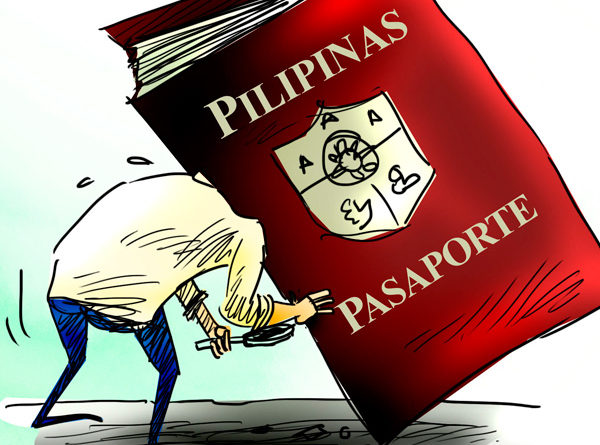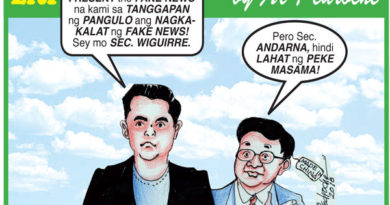COLUMN: FIRST THINGS FIRST– When the foreign secretary scoops the press – By Francisco S. Tatad

FOREIGN Secretary Teodoro Locsin Jr. may have made himself unduly vulnerable to charges of political immaturity and inexperience when he cried wolf on Twitter over the alleged loss of passport data for millions of Filipino passport holders only to withdraw the claim later.
It was the kind of stuff a diplomatic reporter, which I had been for years, might have put out after ascertaining all the facts, but I cannot imagine any of our foreign secretaries doing it. I do not have to go as far back as Apolinario Mabini, but I could cite a number of them. Mauro Mendez, S.P. Lopez, Narciso Ramos, Carlos P. Romulo, all of whom I covered as a reporter; Pacifico Castro, Roberto Romulo, Alberto Romulo, Domingo Siazon Jr,, Blas F. Ople, all close friends; even Albert del Rosario, B.S. Aquino 3rd’s foreign secretary, whom I met not more than a few times.
ADS by Cloud 9:
.
– SPACE RESERVE FOR YOUR ADVERTISEMENT –
.
.
Check all the facts first
In all likelihood, each of them would have ascertained all the facts first before issuing any statement, and not on Twitter (which no foreign secretary before Locsin used), but in a formal statement. Assuming passport data had indeed been lost, Locsin could have done a much better job if instead of simply announcing the alleged loss, he had assured the nation that steps were being taken to protect the interests of those affected by the reported loss. That would have been more like it. He would have been acting more like a foreign secretary than like a newspaper reporter who has just delivered a “scoop.”
How did Locsin get so mixed up? He has not explained this. He said in his tweet that he was ready to “eviscerate alive the Yellows who did the passport deal,” but it turns out his professed desire to “eviscerate the Yellows” is not even as good as the President’s threat to wipe out all drug suspects. From the data made available to the media, it appears that in October 2015, the Department of Foreign Affairs, which does not have a printing facility of its own, transferred its printing contract for e-passports from the Bangko Sentral ng Pilipinas (BSP) to the APO Production Unit (APO-PU). APO-PU then subcontracted the printing to a private firm which Locsin said ran away with the passports data when its contract expired.
ADS by Cloud 9:
.
– SPACE RESERVE FOR YOUR ADVERTISEMENT –
.
.
Yasay reappears
This prompted Perfecto Yasay Jr., the first of Locsin’s failed predecessors under DU30, to come out of the woodwork and say Locsin was “misinformed.” Nobody ran away with anything and there was no loss of data at all, Yasay said. This was confirmed by other official sources, who said there were backup records at the BSP and one other depository. Locsin tweeted back to say he lacked some basic information, obviously, but he wasn’t at all misinformed.
.
ADS by Cloud 9:
.
– SPACE RESERVE FOR YOUR ADVERTISEMENT –
Still, Locsin’s flawed position allowed Yasay to insert into the record a hitherto unheard claim, that his firm opposition to the passport printing deal had cost him his confirmation as foreign secretary by the Commission on Appointments; he said the passport deal was strongly supported by some CA members. This strikes me as highly questionable.
To the best of my recollection, Yasay failed to hurdle the CA confirmation process because the members found his citizenship questionable. He used to teach and practice law in the US, and many CA members believed, as many others still do, that he was for a while a naturalized American citizen. This was never extensively discussed, but the data entered the public domain. On one of his visits to the Manila Times editorial office, I asked Yasay about it. He tried to evade the question by saying only his wife Cecile Joaquin had applied for US citizenship. This is something the Senate could still inquire into, if it is interested.
.
ADS by Cloud 9:
.
– SPACE RESERVE FOR YOUR ADVERTISEMENT –
.
.
A much-needed inquiry
There are many non-meritorious issues on which the Senate has devoted precious hours of useless inquiry; the issue provoked by Locsin’s announcement is one such issue it could sink its teeth on. The first question that must be asked is, why was/is a private printing plant printing Philippine passports, a very important national security-related, personal document? What is the legal basis for contracting it out to a private printer when sufficient official printing facilities, such as the BSP printing plant, exist? If we can trust the BSP to print some of our money — I understand the bulk is still printed abroad — can we not trust it to print our e-passports? What was the reason the printing of our e-passports had to be transferred first from BSP to APO-PU and ultimately to a private printing plant?
Who proposed and brokered this arrangement and what were the peculiar motives? This is just one of the first questions the senators should ask. In 1969 when I first joined the Cabinet, I came face to face with the scandalous transfer of equipment, personnel and funds from a government printing plant to a “private plant” operated by some officials, who billed the government for all their printing jobs, under a patently illegal contract. The parties concerned accused me of “spying” on my colleagues, but I had to report everything to the President.
Some writers for the Times and other newspapers have named some officials of past administrations allegedly involved in the privatization of the passport printing job; a full Senate inquiry should now plow deep into these allegations. And while the Senate is at it, it should extend its inquiry into related important issues. One such issue is the reported outsourcing of the issuance of Philippine visas to Chinese visitors to a private contractor in Hong Kong or Shanghai.
.
ADS by Cloud 9:
.
– SPACE RESERVE FOR YOUR ADVERTISEMENT –
.
.
Three million visas?
Throughout Foreign Secretary Alan Peter Cayetano’s watch, I tried to confirm reports that a former tourism high official and a high DFA official had teamed up to facilitate the entry of 3 million Chinese to the Philippines, at a minimum facilitation fee of $20 per head, on top of the regular visa fee.
The reports were never confirmed, but they persisted nevertheless. And the number of Chinese visitors during DU30’s midterm was unofficially estimated to have climbed to more than 3 million. It could be worthwhile for Locsin and the Senate to take a closer look at this matter. And even more worthwhile for the Senate to inquire where Secretary Locsin intends to take Philippine foreign policy or diplomacy for that matter when he isn’t tweeting.


.jpg)
 All photographs, news, editorials, opinions, information, data, others have been taken from the Internet ..aseanews.net |
All photographs, news, editorials, opinions, information, data, others have been taken from the Internet ..aseanews.net | 






